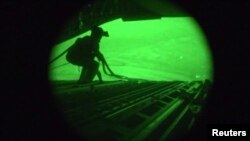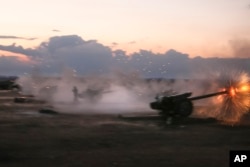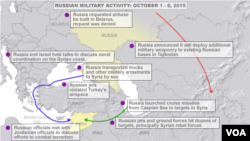Syrian government troops advanced under cover of Russian airstrikes Monday as the United States airdropped 50 tons of small arms ammunition to rebels in northern Syria.
In the heaviest fighting in weeks, government forces battled rebels in a strategic area in the central province of Hama, hoping to regain the Sahl al-Ghab plain.
The fighting was focused on the village of Kfar Nabudeh with Syria’s army command saying it had captured the village, extending its advance toward the key Damascus/Aleppo Highway.
Activists say the rebels repelled the attack, and the Syrian Observatory for Human Rights called the clashes the “fiercest” since the Russian air campaign began in late September.
Russia's Defense Ministry says its aircraft hit 53 targets in Hama, Homes, Latakia and Idlib provinces over the past 24 hours.
Meanwhile, the U.S.-led, anti-Islamic State coalition forces continued to strike Islamic State group (IS) targets Monday, destroying terrorist tactical units near al-Hasakah and Washiya. The coalition conducted 18 strikes in Iraq, including near Bayji, Fallujah and Mosul, according to the U.S. Central Command, which overseas U.S. forces in the Middle East.
New 'normal'
The U.S. airdrop of small arms Sunday reached “Syrian Arab groups whose leaders were appropriately vetted by the United States and have been fighting to remove ISIL,” said coalition spokesman Colonel Steve Warre, using an acronym for IS fighters, who also known as ISIS and Daesh. He would not give further details about the groups or their locations in Syria due to “operational security.”
A U.S. defense official described the airdrop as a new “normal” occurrence that coalition forces would continue to conduct “as needed.”
The airdrop supports the Pentagon’s recent decision to “pause” its failed Syrian rebel train and equip program. Instead of training and equipping moderate rebel fighters outside of Syria, White House officials announced Friday the program would ramp up materiel support to trusted units fighting on Syrian battlefields, while training only rebel leaders in Turkey.
The drop is a reminder of an operation last year when U.S. forces airdropped supplies to Syrian Kurds battling Islamic State forces for the town of Kobani. The group was able to successfully repel IS fighters from the town.
“This airdrop seeks to build on the success those forces have had clearing ISIL from Syrian territory,” Warren said.
UN envoy in Moscow, Washington
The U.N.'s special envoy for the Syria crisis, who is tasked with bringing warring factions in Syria to the negotiating table, told a news conference on Monday he would hold talks in Russia on Tuesday before heading to Washington, in an effort to forge an understanding between the two countries that are both conducting offensives in Syria.
Staffan de Mistura said that while in Russia he also plans to discuss the evacuation of 46 severely wounded people and their family members from a rebel stronghold on the border with Lebanon, along with another 92 wounded people and their families in government-held villages in the northwest. De Mistura is also slated to discuss a number of other issues related to the conflict and its escalation since Moscow's stepped-up military action in Syria. He says he will leave for Washington immediately after to confer with officials about the crisis and ways to get peace negotiations back on track.
On Monday, Russian Foreign Minister Sergei Lavrov said advances have been made in working with Washington on fighting in Syria.
"We still don't 100 percent share the same view on the situation up to every step with our partners in the region, with the Americans, with our other colleagues, but we absolutely have progress," Lavrov said.
EU demands cessation of most Russian strikes
The European Council on Monday issued a formal statement demanding that Russia "immediately" end military attacks in Syria that do not target IS or other U.N.-designated terrorist organizations.
European Union foreign policy chief Federica Mogherini said Russia's military action in Syria is a "game-changer" that has "some very worrying elements."
Before an EU foreign ministers meeting Monday in Luxembourg, Mogherini said actions against IS militants have to clearly be carried out against the group and other terrorists defined by the United Nations.
She said she believes the European Union, Russia and the United States have common ground in Syria based on U.N. Security Council resolutions and a U.N. framework, but that their action must be coordinated.
Otherwise, she said, there are "extremely dangerous" risks, particularly militarily.
On Sunday, U.S. President Barack Obama told CBS television's 60 Minutes that Russia's intervention in Syria is aimed at saving Assad's government.
"Syria was Russia's only ally in the region," Obama said. "And today, rather than being able to count on their support and maintain the base they had in Syria, which they've had for a long time, Putin now is devoting his own troops, his own military, just to barely hold together by a thread his sole ally."
Lisa Schlein contributed to this report.






